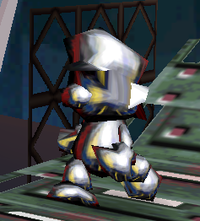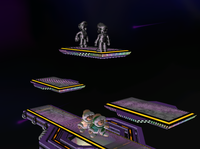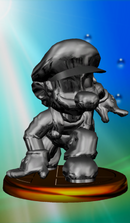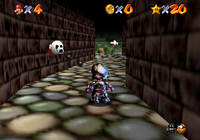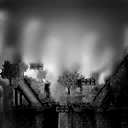Metal Mario
| Metal Mario | |
|---|---|
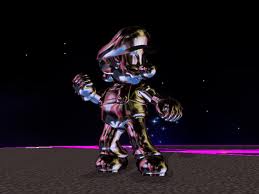  
| |
| A boss in | SSB Melee Brawl SSB4 |
| Universe | Mario |
| Console of origin | Nintendo 64 |
| Location | Meta Crystal Battlefield |
| Article on Super Mario Wiki | Metal Mario |
Metal Mario (メタルマリオ, Metal Mario) is a metallic version of Mario who is a recurring form and character in the Mario series. In Melee, Metal Mario can be joined by a metallic form of Luigi, known generally as Metal Luigi.
In Super Smash Bros.
As a minor boss
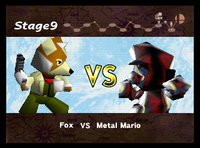
![]() Metal Mario appears in the 1P Game mode of this game as a minor boss opponent to be battled one-on-one. Despite appearing at first glance to be just a simple palette-swap of Mario, he is a very different fighter; he barely flinches to ordinary attacks and is almost unaffected by throws at low percentages, and can sustain an absurd amount of damage before even being put into KO range (often over 300%). However, he is very weak to edge-guarding: once a player manages to knock him off the stage, he will often fail to recover due to his extremely fast falling speed, despite the decent distance that Super Jump Punch grants. Metal Mario never sprints and rarely jumps; he simply walks from place to place at a steady pace. Metal Mario also seldom uses his Fireball even though a normal CPU Mario uses it often, and Kirby will not gain a copy ability from inhaling him. On lower difficulties he mainly walks around the stage, seldom attacking, but he can be tougher on higher difficulties.
Metal Mario appears in the 1P Game mode of this game as a minor boss opponent to be battled one-on-one. Despite appearing at first glance to be just a simple palette-swap of Mario, he is a very different fighter; he barely flinches to ordinary attacks and is almost unaffected by throws at low percentages, and can sustain an absurd amount of damage before even being put into KO range (often over 300%). However, he is very weak to edge-guarding: once a player manages to knock him off the stage, he will often fail to recover due to his extremely fast falling speed, despite the decent distance that Super Jump Punch grants. Metal Mario never sprints and rarely jumps; he simply walks from place to place at a steady pace. Metal Mario also seldom uses his Fireball even though a normal CPU Mario uses it often, and Kirby will not gain a copy ability from inhaling him. On lower difficulties he mainly walks around the stage, seldom attacking, but he can be tougher on higher difficulties.
As a playable character
Metal Mario can be controlled using certain cheat codes such as the debug menu. However, many players consider Metal Mario to be far worse than normal Mario; despite his aforementioned strengths in resisting knockback, he has reduced combo potential, as he cannot efficiently follow up with combos after attacking due to an abysmal short hop, and has awkward aerial and dashing physics. As mentioned before, he also has extremely quick falling speed, which not only hinders his recovery, but makes him very vulnerable to chaingrabs and certain combos.
In Super Smash Bros. Melee
As a minor boss
Metal Mario more or less reprises his role as a minor boss opponent in the single-player Adventure Mode. He appears on the Battlefield stage after the player defeats the fifteen Fighting Wire Frames. Unlike the previous game, Metal Mario is not considered by the game to be a separate character, but rather regular Mario permanently under the effects of the new Metal Box item and with slightly faster falling speed than usual. He also does not resist knockback as much as in the original game.
Metal Luigi joins Metal Mario once Luigi has been unlocked, making the battle much harder. Like Metal Mario, Metal Luigi is considered Luigi under the permanent effect of the Metal Box. Beating both characters will award the player with the Metal Bros. KO.
In addition to their appearance in the Adventure Mode, there is a chance that Metal Mario or Metal Luigi can appear as an enemy in the penultimate fight of the Classic Mode, which pits the player against a random metal character.
As a trophy
Metal Mario also appears as a trophy which can be acquired randomly through the 1-P mode or the Trophy lottery:
- Metal Mario
- Mario was in for a surprise the first time he hit a Metal Box in Super Mario 64. The metal cap that popped out transformed Mario into living metal, giving him great stamina, a heavy tread, and the ability to walk underwater. In Super Smash Bros., Metal Mario showed up as an incredibly stubborn midlevel boss.
- Super Mario 64
9/96
- Super Mario 64
In Super Smash Bros. Brawl and Super Smash Bros. 4
Metal Mario and Metal Luigi return in both Brawl and SSB4 as possible metal characters fought in Classic Mode; which is on Stage 8 (however metal battle is only on Stage 6, 7, 8, or 9). However, even if the player does unlock Luigi, Metal Mario and Metal Luigi will still be fought alone on Classic Mode; and never together unlike Adventure Mode in Super Smash Bros. Melee. Additionally, in Brawl, despite Metal Mario's frequent appearances in the first two games; he is never fought on Battlefield and neither is Metal Luigi unlike 1P Game, Classic Mode, and Adventure Mode in the first two games. He is never, as Battlefield is never fought as a stage in Classic Mode; as do all other metal characters on the metal stage. Same with Metal Luigi.
Metal Mario and Metal Luigi outside of Classic Mode in SSBB and SSB4 can be controlled by collecting a Metal Box or by playing in Metal Brawl/Smash.
Origin
Metal Mario originated in Super Mario 64 as a power-up form of Mario, alongside Wing Mario and Vanish Mario. Mario can become Metal Mario by collecting a Metal Cap, but must first press the Green Switch in a cavern hidden in Hazy Maze Cave. Since then, Metal Mario has made several recurring appearances as both a power-up and a playable character, appearing in Mario Golf 64, Mario Kart 7, Mario Kart 8, Dr. Mario 64, and more.
Unlike Metal Mario, Metal Luigi is original to the Super Smash Bros. series; in fact, outside of Smash Bros., Mario, Wario, and Bowser are the only characters who have been shown in a metallic form. The closest to Metal Luigi appearing in the Mario series is Silver Luigi, Luigi's equivalent to Gold Mario in New Super Mario Bros. 2, who wouldn't debut for over a decade after Metal Luigi debuted in Melee.
Trivia
- If one looks closely at the reflection on Metal Mario's trophy in Melee, the Yoshi's Island stage can be seen. This is easiest to spot on his hat, nose, or bottom.
- Metal Mario along with Giant Donkey Kong are the first characters to be non-playable in one game, then playable in all future games (with items and/or Special Modes). They would be followed by Giga Bowser.
- In Super Smash Bros., Metal Mario's series symbol is a bit different from the Mario series, making it more metallic.
- In Smash 64, when the Announcer introduces Metal Mario, his voice gains a slight change and becomes metallic. Although it may just be to place emphasis on the Mario's metal composition, the Announcer's voice sounds noticeably deeper and the same change in voice does not occur for announcing any other character in Classic Mode.
